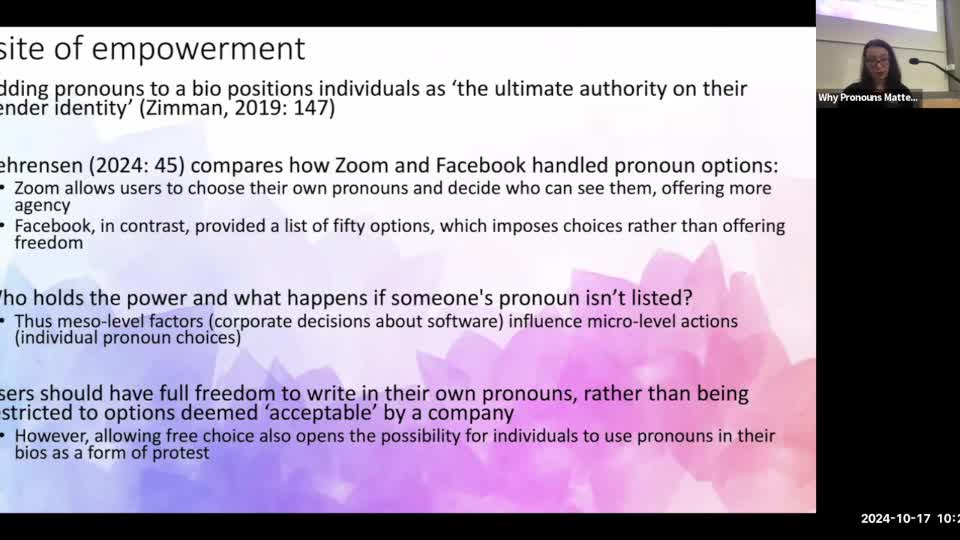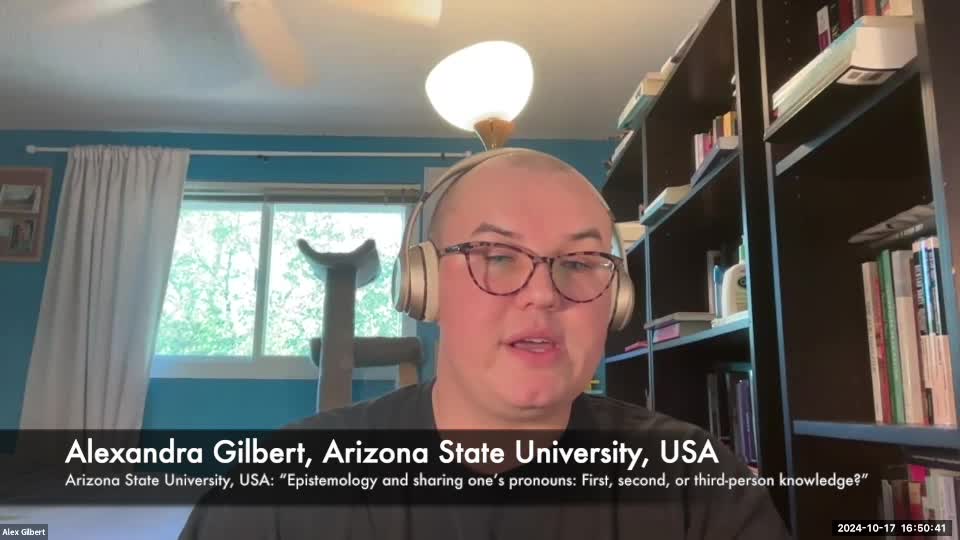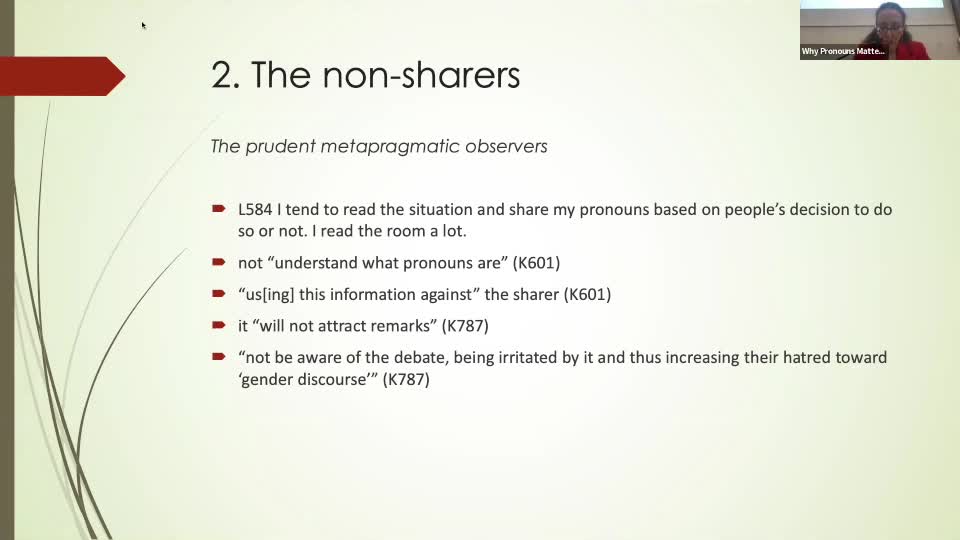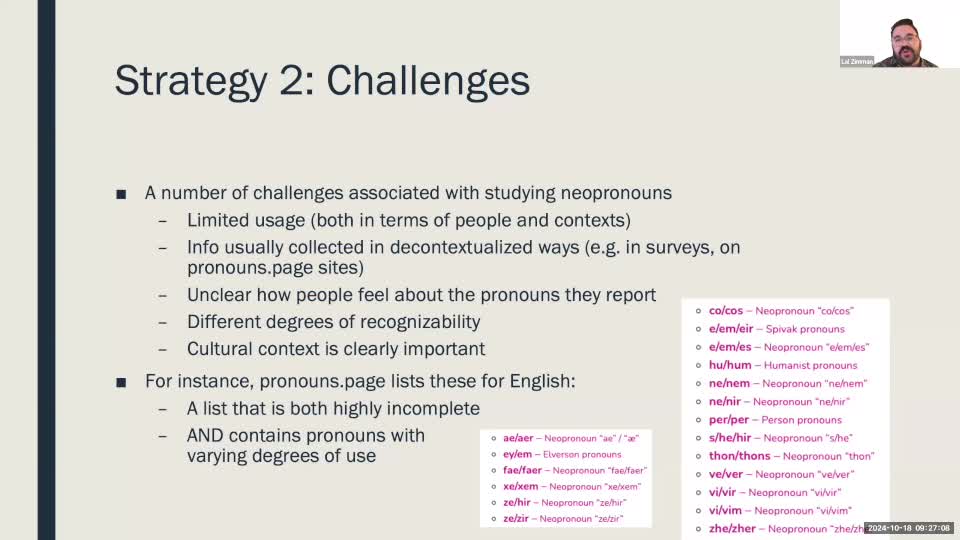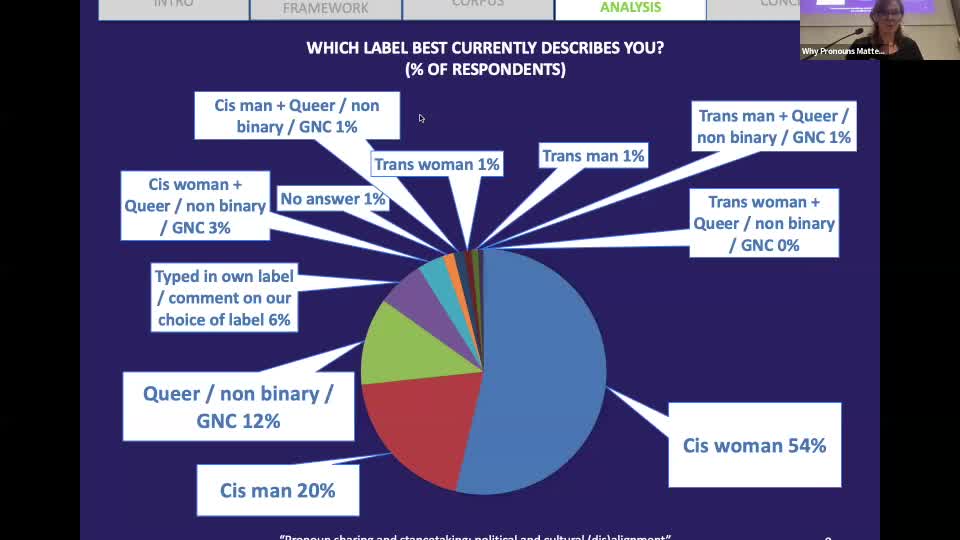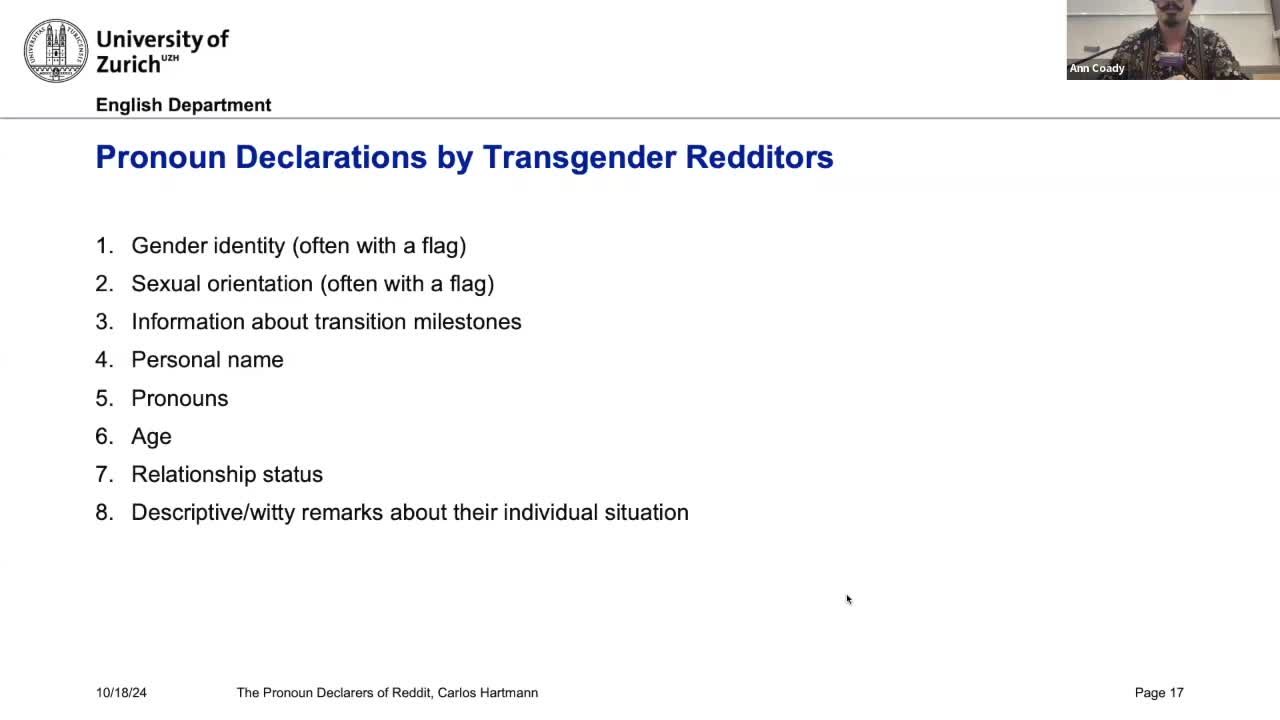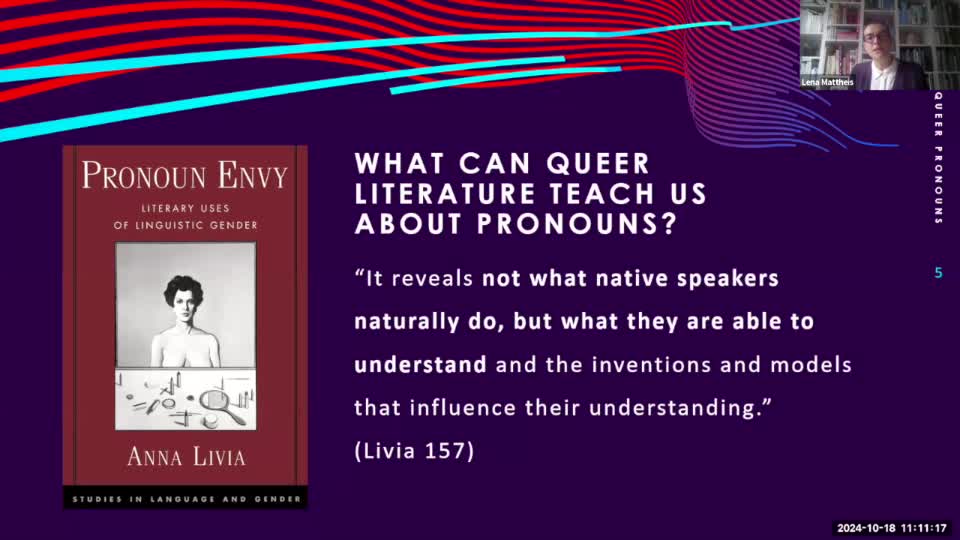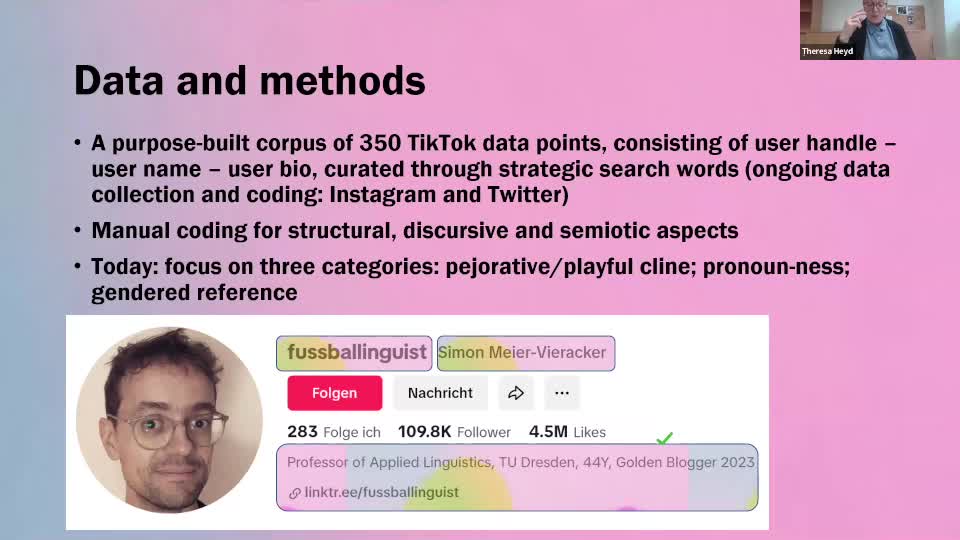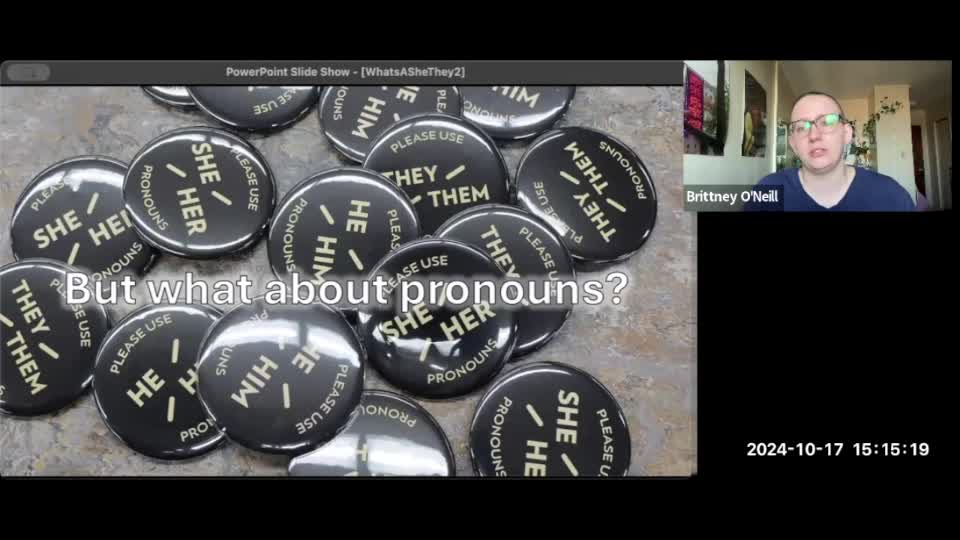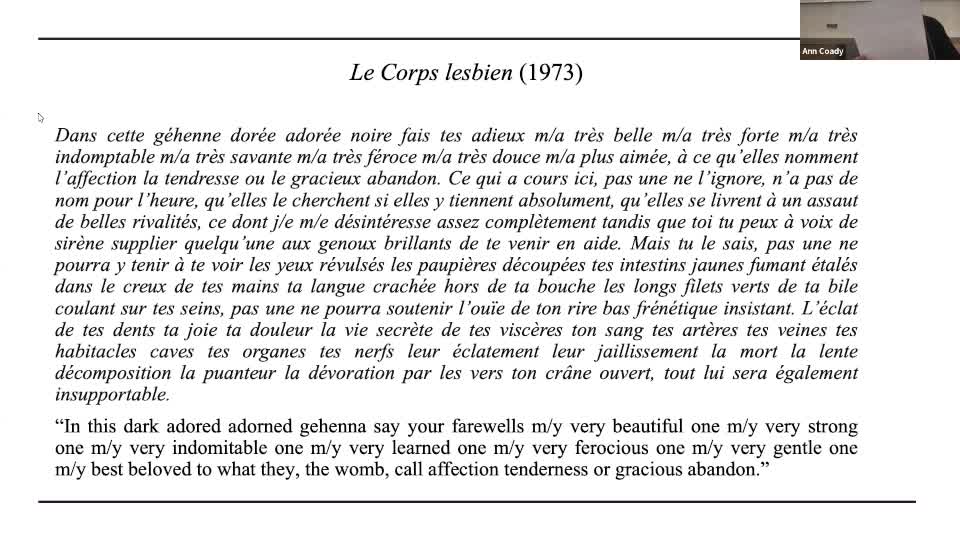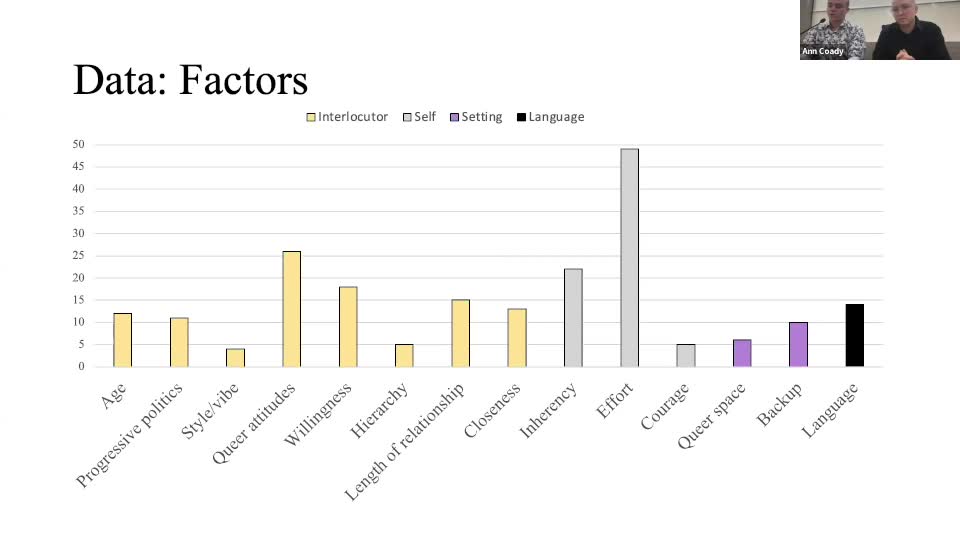Notice
““Mein Name ist Lena und meine Pronomen sind she/her”: Exploring Indexicalities of Pronoun Sharing Practices in English and German”, Hannah Sawall, Universität Duisburg-Essen, Germany
- document 1 document 2 document 3
- niveau 1 niveau 2 niveau 3
Descriptif
Since pronoun sharing has been associated with different political stances from virtue signaling to trans liberation (see e.g. Manion 2018; de Freitas 2021; King & Crowley 2024), it is clear that they transport more information than simply how a person asks to be referred to. My study therefore explores indexicalities (Silverstein, 2003; Eckert, 2008) of pronoun sharing practices of English and German speakers.
Practices of pronoun sharing are present in online contexts but also especially in queer offline-spaces. People often share which third-person singular pronouns they want others to use in nominative and accusative case (e.g. she/her). However, the motivations for people’s pronoun choices and form of sharing them remain unexplored. In German specifically, some people use language-crossovers as they share English pronouns in otherwise German speech/texts (see also Minning 2004). Since pronoun sharing has been associated with different political stances from virtue signaling to trans liberation (see e.g. Manion 2018; de Freitas 2021; King & Crowley 2024), it is clear that they transport more information than simply how a person asks to be referred to. My study therefore explores indexicalities (Silverstein, 2003; Eckert, 2008) of pronoun sharing practices of English and German speakers.
I use triangulation of English and German data sources including (online) ethnography to cover different contexts in which pronouns are made relevant. While some social media platforms (e.g. Instagram, Reddit) allow users to share pronouns and can thereby influence pronoun sharing choices, they are also home to metalinguistic discussions. Additionally, ethnographic interviews survey people’s experiences with and thoughts on as well as their own reasons for (or against) pronoun sharing.
Preliminary results suggest a complex indexical link between pronouns and gender, where sometimes pronoun sharing can be used as an additional modality of gender expression (see Kotthoff 2003). Furthermore, choices about whether/how pronouns are shared are influenced by other factors like globality/internationality (see e.g. Jenkins, 2014; Vriesendorp & Rutten, 2017) and participants’ personal experiences. Understanding those connections will improve our understanding of how people (try to) manage the perception of their identities in both on- and offline contexts and can, in turn, make pronoun sharing practices more gender-affirming — especially for trans people.
Thème
Dans la même collection
-
“Pronouns in bio: A site of empowerment, validation, struggle, performance, distraction, and corpor…
Pronouns in bio: A site of empowerment, validation, struggle, performance, distraction, and corporate rainbow washing?
-
“Epistemology and sharing one’s pronouns: First, second, or third-person knowledge?”, Alexandra Gil…
In this paper, I consider sharing one’s pronouns as an act that asserts self-knowledge and positions oneself in relation to an addressee and a shared social landscape: see me this way, interact with
-
“What’s in a pronoun and how does it matter?: From the perspective of pragmatics”, Sandrine Sorlin,…
SorlinSandrineIn this talk, I wish to give a quick overview of the quite recent ‘pronoun sharing’ trend from a linguistic and pragmatic perspective, going through the new collocations and semantic shifts of the
-
"Pronouns, positionality, and power: Institutionalized transphobia, intersectionality and trans-aff…
ZimmanLalThis talk explores the complex role of pronouns in the negotiation of (socio)linguistic justice, leading to the argument that the success of trans-affirming language depends on a broader
-
““Wait, what are your pronouns, sorry?”: Conversation analysis of pronoun requests in comedians’ cr…
Comedians on TikTok frequently show videos of their crowd work, where they ask questions to the attendees. While this is not part of their structured stand-up, it allows for spontaneous interaction
-
“Pronoun sharing and stancetaking: political and cultural (dis)alignment”, Ann Coady, Université Pa…
I begin my presentation by putting current pronoun-sharing practices in political and theoretical context, briefly discussing the current political debate surrounding these practices and comparing
-
“A sociolinguistic case study on the Pronoun Declarers of Reddit”, Carlos Hartmann, Universität Zür…
For this study, I extracted and analyzed Reddit comments featuring pronoun declarations within their user flairs, the optional descriptors displayed alongside usernames. The goal was to identify a
-
“Gendernonconforming Pronouns in Literature”, Lena Mattheis, University of Surrey, UK
Queerly reshaped pronouns, forms and narrative strategies are flourishing in contemporary non-binary, trans and queer literature. From singular ‘they’ to ‘it’ to neopronouns to the collective voice of
-
“Mock pronouns”, Theresa Heyd, Universität Heidelberg, Germany
HeydTheresaThis paper gives an account of mock pronouns as a (predominantly digital) discursive practice. The rise of pronouns and pronominal discourse as a gender-inclusive practice has been accompanied by
-
““What’s a she/they?”: An (auto)ethnographic exploration of epistemic justice and the double bind o…
In this paper, I combine autoethnographic reflections with an exploration of epistemic injustice (e.g. Berenstain, 2016; Davis, 2016; Fricker, 2007; Pohlhaus, 2014) to consider how the persistent
-
“Pronouns, past struggles, new practices: political continuity or radical change?”, Claudine Raynau…
RaynaudClaudineI would like to compare two second wave French feminists’ thought and LGBTQIA+ theorizing and practice regarding pronouns and ponder their possible interactions. My focus will be the work of Luce
-
“Pronouns in Motion: Pronoun variability among Swiss non-binary individuals”, Justyna King and Elij…
Our paper aims to explore pronoun practices and flexibility among Swiss non-binary individuals, by elucidating the factors influencing the pronoun usage of Swiss non-binary people, discerning the
Sur le même thème
-
Entretien avec Ariane Mak autour de son ouvrage En guerre et en grève. Enquêtes dans les cités mini…
MakArianeDe 1939 à 1945, le Royaume-Uni a connu plus de 7 000 grèves, en grande partie dans l’industrie charbonnière.
-
Prendre position dans le trouble / Carnet de passages #2
CourdurièsJérômePitzalisJuliaPeyrautLolaMontécotRobinPayssanAlexiComment s’empare-t-on d’une toute nouvelle thématique ? Comment traiter d’un sujet d’actualité mais surtout polémique ? L’expérience de l’anthropologue Jérôme Courduriès s’est construite au travers
-
“Mock pronouns”, Theresa Heyd, Universität Heidelberg, Germany
HeydTheresaThis paper gives an account of mock pronouns as a (predominantly digital) discursive practice. The rise of pronouns and pronominal discourse as a gender-inclusive practice has been accompanied by
-
““Wait, what are your pronouns, sorry?”: Conversation analysis of pronoun requests in comedians’ cr…
Comedians on TikTok frequently show videos of their crowd work, where they ask questions to the attendees. While this is not part of their structured stand-up, it allows for spontaneous interaction
-
“A sociolinguistic case study on the Pronoun Declarers of Reddit”, Carlos Hartmann, Universität Zür…
For this study, I extracted and analyzed Reddit comments featuring pronoun declarations within their user flairs, the optional descriptors displayed alongside usernames. The goal was to identify a
-
“What’s in a pronoun and how does it matter?: From the perspective of pragmatics”, Sandrine Sorlin,…
SorlinSandrineIn this talk, I wish to give a quick overview of the quite recent ‘pronoun sharing’ trend from a linguistic and pragmatic perspective, going through the new collocations and semantic shifts of the
-
“Pronoun sharing and stancetaking: political and cultural (dis)alignment”, Ann Coady, Université Pa…
I begin my presentation by putting current pronoun-sharing practices in political and theoretical context, briefly discussing the current political debate surrounding these practices and comparing
-
"Pronouns, positionality, and power: Institutionalized transphobia, intersectionality and trans-aff…
ZimmanLalThis talk explores the complex role of pronouns in the negotiation of (socio)linguistic justice, leading to the argument that the success of trans-affirming language depends on a broader
-
“Pronouns in Motion: Pronoun variability among Swiss non-binary individuals”, Justyna King and Elij…
Our paper aims to explore pronoun practices and flexibility among Swiss non-binary individuals, by elucidating the factors influencing the pronoun usage of Swiss non-binary people, discerning the
-
“Epistemology and sharing one’s pronouns: First, second, or third-person knowledge?”, Alexandra Gil…
In this paper, I consider sharing one’s pronouns as an act that asserts self-knowledge and positions oneself in relation to an addressee and a shared social landscape: see me this way, interact with
-
“Pronouns in bio: A site of empowerment, validation, struggle, performance, distraction, and corpor…
Pronouns in bio: A site of empowerment, validation, struggle, performance, distraction, and corporate rainbow washing?
-
“Pronouns, past struggles, new practices: political continuity or radical change?”, Claudine Raynau…
RaynaudClaudineI would like to compare two second wave French feminists’ thought and LGBTQIA+ theorizing and practice regarding pronouns and ponder their possible interactions. My focus will be the work of Luce


